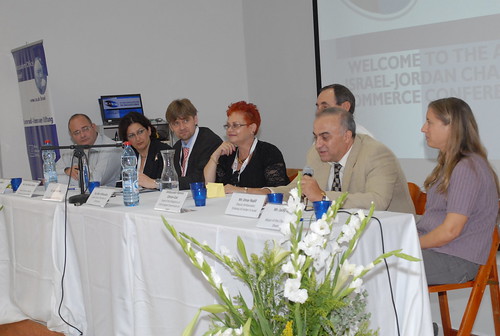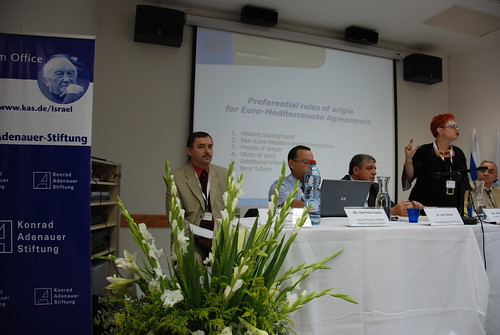Sixth Israeli Jordanian Annual Business Meeting - Foundation Office Israel
Event Reports
A significant and symbolic change took place this year: From the traditional meeting place at the Sheikh Hussein Border Crossing between Israel and Jordan, the venue was moved to the city of Beit Shean, in Israel proper. Ms. Merri Minuskin, the director of the Israel Jordan Chamber of Commerce, opened the conference with an important announcement: The next meeting should take place in Jordan following the planned establishment of the Jordan Israel Chamber of Commerce.
Divided in two main parts, the conference dealt first with the current situation and the existing joint business agreements with the EU and the USA as well as their potential developments. In the subsequent workshops, four working groups discussed with experts subjects relevant to their own businesses.
14 years after the signature of the peace agreement between Jordan and Israel, the economic benefits enjoyed by both countries cannot be denied. The QIZ agreement between Jordan, Israel and the USA has generated constant increase in exports from both countries. The commercial exchange figures speak for themselves: Exports from Jordan to the US have grown from 15 million dollars to 1,5 billion dollars in the last 10 years and trade between Israel and Jordan is steadily growing.
However, for Mr. Omar Nadif, deputy Ambassador to Israel, if the significance of the trade agreements must not be demonstrated, other dimensions of the peace accord are still missing. Many Jordanians – even businessmen – feel that the peace process is still limited and they have not yet benefited from its full dividends. Positive political developments in the relations with the Palestinians will bring more security and improve the relations, which in return will encourage more businessmen to cooperate with their Israeli counterparts.

Ambassador Jacob Rosen and Deputy Ambassador Alon Ruth from the Israel Embassy in Amman are well aware of the challenges posed by some current difficulties. In order to reduce the “blockages”, they both feel the need to identify mutual national priorities and capabilities. To that purpose the Israeli Embassy in Amman organizes specialized bilateral meetings and publishes information papers in order to expose both business communities to the many possible cooperation sectors.
A good example of close cooperation between Israel and Jordan was given by Gabby Bar, Regional Director of the Israeli Ministry of Industry, Trade and Labor. Last July a joint Israeli – Jordanian delegation had important meetings with high-ranking officials in Washington in order to promote the creation of a trilateral cumulation of rules of origin between the US, Jordan and Israel once the full free trade agreement between Jordan and the USA will come into effect in 2010. With these new trade agreements Israel and Jordan could eventually export to the USA from one single territory.
Dr. Hänsel, director of the Konrad-Adenauer-Stiftung to Israel and Ambassador Cibrian-Uzal, representative of the European Commission in Israel, both referred to the European model that started first with sharing common economic interests and achieved political cooperation among 27 countries. Is this model relevant for the Middle East? Through its European Neighbourhood Policy, the EU wants to give the countries in the region the opportunity to take part in different policy co-operations in key sectors such as energy or transport; it wants to encourage the neighbours such as Jordan and Israel to improve their relations while including other parties - such as the Palestinian Authority - in the process. And one of the keys to this achievement is the promotion of trade and economic ties.
The existing trade agreements between Jordan, Israel and the USA or the European Union such as the Qualified Industrial Zones (QIZ) agreement and the “Pan EuroMED Cumulation” have already brought important realizations as well as the consolidation of bilateral agreements. The potential of the “Pan EuroMED Cumulation”, however, has not been used at its full capacity and it should not be limited to specific sectors such as textiles or high-tech.
The EU has already planned specific PanEuroMed projects in the region which are extremely ambitious on the long-term basis. To better integrate the economies of Jordan and Israel, the European Investment Bank is ready to finance many projects such as building a railroad linking the city of Irbid in northern Jordan to the Israeli port of Haifa. This railroad of 70 km would increase and improve bilateral trade as well as export to the USA and Europe since the use of Haifa port for the Jordanians is more rational and much less costly than to export through the port of Aqaba on the Red Sea. This railroad would also benefit the Palestinians with the construction of side lines to Jenin and to Nablus. Grants and supports programs from the EU are ready in order to help Jordan finance its part of the project. Moreover, the European Investment Bank is also prepared to help Jordan develop the Aqaba international airport so that it could be utilized jointly by Israel and Jordan and replace Eilat airport, which has reached its capacity and cannot be expanded.
These important projects are not limited to business and trade exchanges. Their political dimension makes it necessary for both countries to reach strategic decisions and to present joint requests.
For the businessmen of both countries, the EU market is closer and offers more sectors of cooperation than within the Qualified Industrial Zones framework. Considering the unused potential of the "Pan EuroMED Cumulation" system - which is also more complicated that the QIZ structure - the organizers of the meeting decided to help the business community get better acquainted with the Preferential Rules of Origin for Euro-Mediterranean Agreements. To that purpose they invited an expert form the Taxation and Customs Union at the European Commission in Brussels. Mr. Kroczynski prepared an extensive presentation in order to explain the rules of pan-Euro-Mediterranean cumulation and the types of proofs of origin that are applicable in Jordan and in Israel. He also presented some of the advantages of the system:
-Improved market access for products from all partners of the enlarged pan-Euro-Mediterranean zone
-Increased incentive for investments
-Increased economic co-operation and trade between all partners
-Enlarged sourcing possibilities for materials and products for all partners
-Improved possibilities for producers to realise sizeable savings by organising their activities on a larger scale.

Mr. Kroczynski, however, made it clear that the pan-Euro-Med cumulation is only a tool. In itself it cannot grant success but it provides economic operators with means to help them achieve these goals.
In the second part of the meeting the Israel and Jordanian participants were divided into smaller groups and attended four workshops dealing with the following subjects: “Technology”, “Agriculture, Water and Environment”, “Logistics and Cargo” and “Industry”. These workshops gave them the opportunity to hear presentations on projects in their particular fields of interest and to discuss in details subjects in which they require more data and information as well as adapted solutions. Most importantly, the workshops were conceived as “matchmaking” meetings between the business people from both countries looking for partners.
The organizers were very happy to note that in spite of the change of venue, more Jordanians than Israelis attended the meeting this year and that new participants from both countries attended the meeting for the fist time, confirming the interest for joint projects among the business people of both countries. As direct results of this conference, the director of the Israel Jordan Chamber of Commerce and the only Jordanian businesswoman present decided to set up a joint businesswomen working group in the very near future. The Chamber of Commerce in cooperation with the Ministry of Foreign Affairs and the Delegation of the EU Commission to Israel will also coordinate committees to discuss in details the joint Israel – Jordanian projects proposed by the EU Commission.
As Ambassador Cibrian-Uzal reiterated, the EU is ready to sponsor these projects but Jordan and Israel must first show their political will to better integrate the economies of both countries. Closer economic relations are the road to peace that will benefit the whole region.
The new conference framework allowed effective discussions, exchanges and closer contacts and the feedback from the participants was excellent. Most of them already confirmed their participation for the next meeting and to coin a phrase, let us conclude with “Next Year in Jordan!”
Catherine Hirschwitz


